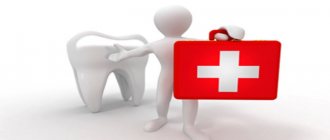Antique mold for modeling the surface of teeth. Yes, it is possible that, according to compulsory medical insurance, a crown will be made on this one.
From each of your salaries you deduct 5.1% for compulsory medical insurance. That's quite a lot. If your salary is 100,000 rubles, then every year you deduct 61,200 rubles. At this point, everyone begins to get nervous, realizing that a VHI policy with much better quality treatment will not be cheaper. In fact, you just need to understand that the tasks of these types of insurance are radically different. With your compulsory medical insurance contributions, you also pay salaries to surgeons and maintain hospitals where you can be taken if you are unlucky and a brick falls from the roof on your head. Pensioners, people with salaries in the minimum wage region, and children receive medical care with the same money. Hence the dramatic difference in quality and tasks. According to VHI, they can pull out a nail, but according to compulsory medical insurance, they can only bend it, so that it is convenient and does not reduce the quality of life.
You can also just come and pay yourself. This also makes sense when we talk about procedures that are not covered by compulsory health insurance and voluntary health insurance. For example, obesity treatment is almost never covered by insurance, even though it plays an important role in the patient's health.
Dentistry can also be paid for from three sources:
- Pay yourself. You will receive as good a level of service as you can afford to pay for. This is the only way to usually pay for the most expensive manipulations and high-quality designs.
- Go for compulsory medical insurance. It's not all bad, you can get basic medical care, but in general it all comes down to the cheapest false teeth so that you can chew at least somehow. It may be suitable for simple things.
- Go to VHI. Coverage depends on the policy and most often does not provide the opportunity to get high-quality prosthetics or use expensive equipment and materials. But this option will cover the prevention and treatment of initial forms of caries well.
I’ll tell you now what exactly is worth treating under what insurance.
What do you need to register with a dental clinic and how to make an appointment?
To register, the patient must go to the selected clinic with a compulsory medical insurance policy, a passport and a written application. At the registry, the data will be entered into the database and the services will become available.
Appointments can be made in advance through a personal call to the PC, through a terminal in the lobby or through an online application. The patient receives a coupon with which he goes to see a doctor.
Without a coupon they are accepted only in acute situations when it comes to emergency care.
The compulsory medical insurance policy is also valid in some private clinics. The list is also on the insurance company’s website, but there are usually not many of them. Since insurance is not able to cover clinic costs for treatment, free services are provided by a few private dentists.
VHI in dentistry
VHI programs are very different. Dentistry is not only expensive for the state, but also for insurance companies. That is why this point is always described with a large number of exceptions and reservations. Most often this is a co-payment - you pay at least 10-15% of the total bill yourself.
VHI almost always includes prevention. Good prevention is cheaper than treatment, which is why insurance companies always include professional hygiene in their policies. Usually these are two professional cleanings per year with fluoridation, which are quite sufficient if the enamel is highly resistant, unless you have any critical periodontal problems or concomitant diabetes mellitus, for example. Professional procedures for periodontitis are often no longer covered by insurance in the required quantity and volume. Actually, VHI first of all tries to exclude chronic diseases that are expensive to treat and which will bring a guaranteed loss.
Standard inexpensive voluntary health insurance usually includes only uncomplicated caries. This is when there is a defect in the enamel and/or dentin, but nothing else is affected. Moreover, the defect is not very large.
If caries is complicated by pulpitis or periodontitis, then the insurance company most often immediately rolls out a huge list of restrictions, which most often come down only to eliminating acute pain to a minimum extent. Does not hurt? Great. Then for your money. Endodontics is allowed to a very minimal extent; aesthetic restorations, inlays and crowns after treatment are almost never included in insurance, since this is the most expensive part of the treatment.
However, sometimes there is VHI, which allows almost everything, including implantation, but it works differently. The insurance company's standard voluntary health insurance refers to risk contracts. That is, they are asking conditionally 15,000 for each of your employees per year and are obligated to treat them. It is understood that only a portion will be sick and the unspent surplus will be enough to ensure profit. If everyone gets sick en masse, then the insurance company is at a loss.
The second option for VHI is deposit. This is when you have a reputable oil company and you want to provide your top employees with the highest level of treatment. Naturally, you have no idea how to organize medical care and where to go with these problems. To do this, you come to the insurance company and say that here is a deposit for you, within the framework of which you will treat our employees. The insurance company does not bear any risks here and works as a management company in your home, organizing treatment. It was with such VHI that people came to us for full treatment with implantation and orthopedics. But this is rather an exception.
How to make an appointment at a private clinic:
Even if a private clinic is included in the insurance company’s list, you should check with the clinic directly about the possibility of treatment under compulsory medical insurance. Do not forget that the patient may still pay for some procedures. It is better to ask these nuances before starting treatment to avoid misunderstandings.
If the clinic really provides compulsory medical insurance services, the patient must go to the clinic at his place of registration and get a referral from a doctor.
When all the details have been resolved, you can make an appointment.
IMPORTANT!
Contact your insurance company with any confusion or questions. This can be done by calling the hotline or during a personal visit.
Insurance companies are very economical
Insurance companies often pay clinics on a deferred basis. At the same time, they do not pay for individual manipulations if it goes even slightly beyond the very narrow standards required. But this is still beneficial for clinics, although often an entire department is busy analyzing insurance claims.
It is very important for the clinic to bring a new client so that he feels that he will feel good there and that the doctors are professionals. Conventionally, the insurance company will cover two cleanings, and he will cover another one in addition to the coverage, if necessary.
At the same time, doctors always try to clarify in advance what will be included in the insurance and what will not, so that the patient does not get nervous. Unfortunately, this is not always possible, since during the treatment of caries it may turn out that it is no longer caries, but very much pulpitis. Then either the clinic has to perform some manipulations at a loss, or ask the patient to pay the required amount. There is another very important point: the insurance company may not pay for the level of treatment accepted in the clinic. For example, we believe that treatment without a rubber dam is simply unacceptable from the point of view of asepsis and isolation of the surgical field. This is important to reduce the risk of infection. The insurance company may not cover it. Doctors again have to either ask the patient to pay extra or worsen the quality of treatment in order to meet the requirements of the insurance company. Clinics that focus on accepting patients under VHI are ultimately forced to save significantly on the most complex and top-of-the-line things like microscopes.
Consumables and drugs under compulsory medical insurance
Insurance companies only pay local manufacturers. Therefore, imported consumables and medicines are not included in the program.
What you can count on:
Composite material
Some domestic medicines
Material for dressings
Consumables for equipment
Anesthesia drugs
In general, this is not a small list that allows you to qualitatively cure a tooth or an oral disease.
In some cases, the doctor may suggest an alternative imported material, but it will be added to the invoice for payment.
. You can refuse the offer; the decision is up to the patient.
Light seals
Dental cement is one of the very first materials in dentistry. Over the entire period of use, it has proven itself well, despite its short service life. But in modern dentistry, better alternatives have appeared - light fillings.
They are also included in the insurance program and can be installed free of charge, but only if indicated. In free dentistry, such fillings are most often placed on the front teeth.
Compulsory medical insurance is a mass product
Features of compulsory medical insurance in general
- Prevents you from dying in case of an acute condition.
- Prevents you from becoming disabled due to the development of a serious illness.
- Covers single, particularly expensive surgeries such as neurosurgery, joint replacement or coronary artery bypass grafting.
- Provides an acceptable level of health to the maximum number of citizens.
- Provides free expensive medications to certain groups: growth hormone for children, insulin for diabetics, monoclonal antibodies for people with rheumatism.
Pros of compulsory medical insurance
Let's just estimate whether medicine is as accessible as we think. Let's take severe forms of rheumatism, for which a council of doctors found the use of glucocorticoid hormones ineffective. Accordingly, it is necessary to provide the patient with lifelong therapy with monoclonal antibodies like Sarilumab. They allow you to more precisely turn off inflammatory reactions by binding specific interleukins. The drug is required to be administered at a dose of 200 mg every two weeks, depending on the clinical situation. A quick search shows that the average cost of such a dose starts at 73,000 rubles. That is approximately 1,750,000 per year. For life. And yes, such drugs are covered from the compulsory medical insurance budget if they are vital, despite limited quotas. It’s difficult to afford this at your own expense, even with a very good salary.
Inpatient treatment is also not a gift. The average cost of treatment in Moscow, according to the Federal Compulsory Medical Insurance Fund:
- Stroke - 196–477.6 thousand rubles.
- Heart attack - 169.3–319.1 thousand rubles.
- COVID-19—200–205.2 thousand rubles.
And there are all sorts of orphan diseases, insulins and hormones. This is unaffordable for most people. Voluntary health insurance does not insure against this either; they are either not interested in such risks, or the cost of insurance will be simply prohibitive. In addition, the state system is required to maintain a developed network of hospitals designed for large volumes. If the current flow is transferred to private clinics and voluntary health insurance, then they will most likely become ineffective as well.
Cons of compulsory medical insurance
Compulsory medical insurance is a conveyor belt that operates with conditional morbidity figures per 100,000 population. His task is, first of all, to prevent you from dying or getting some kind of severe disability, after which you will not be able to work and pay taxes. His tasks do not include comfortable anesthesia, aesthetic incisions, pleasant music in the halls and the absence of queues.
That is why it is so uncomfortable in the case of simple and inexpensive diseases. In this case, it is much more pleasant to use VHI or even pay for the appointment yourself.
Compulsory medical insurance, voluntary medical insurance or payment yourself?
It all depends on finances. If you are a hygiene maniac and regularly visit the dentist, then compulsory medical insurance will be quite good. Moreover, private clinics often also operate under compulsory medical insurance. It’s not worth doing something complicated under compulsory medical insurance - there are risks of getting a cheap irreversible solution, which you will then have to redo at your own expense.
If your employer provides you with voluntary health insurance, great. At a minimum, you should not neglect the prevention from the package. Basic things will be included there and in good quality. But be prepared for unexpected surcharges if you have very limited coverage.
If you want it perfect, with microscopes, rubber dams, 3D scanners and other high-tech, then VHI will not cover it. You will have to pay for such things out of your own pocket. Crowns, bridges and orthodontic braces will also have to be done at your own expense.
PS If you come to our clinics, then say that you are from Habr, there will be a 5% discount.
Dentistry. Where is it better to treat teeth: in paid clinics or government ones?
For many years, public dental clinics remained a place where people went with great caution and only when it was necessary to have teeth removed.
Not everyone thinks about resorting to treatment as soon as the first symptoms begin; most people wait until the last minute, when there is nothing left to “save” and the only way to get rid of the aching pain is by removing a tooth. Why don't people go to get their teeth treated when they first start to bother them? After all, in public dentistry, treatment is provided free of charge; you just need to take a coupon and just come for an appointment. It's not just about the medical equipment, which looks more like instruments of torture, but also about the quality of the material. Sometimes one filling has to be changed several times a year! In addition, removing, treating, and filling teeth is not a pleasant pleasure.
Free health care facilities are funded by the state, but not to a sufficient extent. And this, of course, is reflected in the quality of the equipment. Therefore, the emergence of paid dental clinics is due to the fact that people were willing to pay for quality care rather than experience terrible pain in public dentistry.
People welcomed the emergence of private dental clinics. Although the owners of private dental offices also had a hard time. In view of the new transformations in the country's economy, it is not enough to be a first-class specialist in your industry; you also need to have knowledge of accounting and other nuances of doing business. Of course, all dentists want to perform their direct duties without being distracted by business concerns. But still, private clinics continue to open, because this is an excellent opportunity to establish yourself as a professional in your field and work not for the state, but for yourself.
Today the situation is different. Specialists do what they love, and clinic managers may not understand anything about dentistry; it is enough for them that they know how to become an entrepreneur. It turns out that everyone benefits: dentists, clinic owners and patients, who can now be at least a little confident in the effectiveness of the services provided.
Despite this, there are a number of unsolved problems in both paid and public dental clinics.
Disadvantages of free dentistry:
1. Low quality of service.
The demand for dental treatment is very high. People constantly need the help of dentists. And the technologies used for treatment are outdated.
2. Methods are used that are harmful to the health of patients.
For example, stamped crowns. It is best to use cast crowns. There is a minimal gap between them and the tooth.
Problems of private dentistry:
1. Saving on necessary costs.
For example, they save on consumables, a change of clothes, proper nutrition and rest areas for dentists.
2. Incorrect organization of medical work.
Many paid dentistry work from 9.00-21.00. This, on the one hand, is a violation of labor legislation, according to which the working day should not exceed 33 hours and be less than 42 hours a week, and on the other hand, the dentist’s severe overwork affects the quality of his work and the risk of medical error is high.
3. The clinic’s warranty obligations rest entirely with the doctor.
If the dentist performed his work poorly, he bears financial responsibility for this. The amount of damage is recovered from the salary of the medical worker. The owner of a private clinic is exempt from additional costs for possible mistakes of his specialists.
Thus, it cannot be said with certainty that paid clinics are better than public ones. Both medical institutions still have work to do.
Of course, the appearance of the hospital is of great importance. It is much more pleasant to sit on a soft leather sofa and wait for a doctor’s invitation than to sit in line on a hard bench. It is much more pleasant to be in a cozy room with a beautiful design than in a place with shabby walls. But. There are plenty of low-qualified doctors everywhere. And this is the biggest disadvantage.










